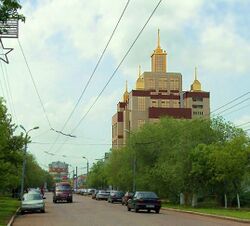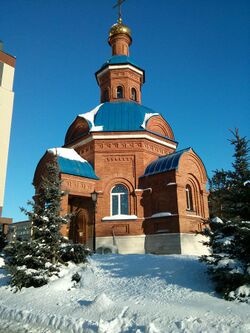Organization:Orenburg State University
Оренбургский государственный университет | |
| Latin: Universitas Publica Orenburgensis | |
Former name | evening department of the Kuibyshev Industrial Institute (14.09.1955-1.1.1971) |
|---|---|
| Motto | Russian: Ученье разум просвещает |
Motto in English | Learning enlightens the mind |
| Type | Public |
| Established | 1955 |
| Rector | Sergey Miroshnikov |
Administrative staff | 3,000 |
| Students | 43,000 |
| Undergraduates | 40,000 |
| Postgraduates | 3,000 |
| Location | Orenburg , Orenburg Oblast , [ ⚑ ] : 51°46′41″N 55°06′29″E / 51.7780°N 55.1080°E |
| Campus | urban |
| Website | www.google.com |
| University rankings | |
|---|---|
| Regional – Overall | |
| QS Emerging Europe and Central Asia[1] | 401-450 (2022) |
Orenburg State University (Russian: Оренбургский государственный университет, Orenburgskiy gosudárstvennyy universitét), previously known as Orenburg Polytechnic Institute (Russian: Оренбургский Политехнический Институт, Russian: ОГУ, OGU), is a university in Orenburg, Orenburg Oblast, Russia.
History
The university was founded in 1955 as a branch of Kuibyshev Polytechnic Institute. In 1971, it converted into Orenburg Polytechnic Institute. In 1994, it became Orenburg State Technical University. In 1996, converted into Orenburg State University. In 2014, Orenburg State Institute of Management integrated with Orenburg State University.
Staff and students
The university employs more than 1,200 academics and 1,800 support staff. More than 40,000 undergraduates and 3,000 advanced degree candidates are enrolled.
Campus
The university's main campus is composed of four education buildings, a dining hall, a health-improving and physical training gym with sport grounds, a library, students’ polyclinic and the Chapel of Saint Martyr Tatiana.[2] The OSU campus also includes:
- Dormitories
- Medical Prophylactics Center
- Students’ Center
- The Palace of Culture "Russia"
- The Palace of Youth Creativity "Progress"
- OSU Museum
- Geologic Museum
Institutions and research centres
- Institute of Bioelements is the satellite centre to Trace Element — Institute for UNESCO in Russia
- Institute of Micro and Nanotechnology
- Laboratory electronic media for educational purposes
- Small Academy of Public Administration
- Interdepartmental laboratory of geographic information technologies
- Interdisciplinary Regional Centre of Training and Retraining
- Meteorological Training Station
- Research Institute of History and Ethnography of the Southern Urals
- Research Institute of Regional Economy
- Research Centre for monitoring of buildings and structures
- Research and Education Center of Biochemical Physics of Nanosystems
Rectors
- Aleksander Burba (1971-1983)
- Ramses Abdrashitov (1983-1987)
- Anatoly Kozachenko (1987-1989)
- Victor Bondarenko (1989-2006)
- Vladimir Kovalevsky (2006-2015)
- Zhanna Ermakova (2015-2020)
- Sergey Miroshnikov (acting rector since 2020)
Alumni
- Vladimir Elagin, governor of Orenburg Oblast (1991–1999)
- Nikolay Grigoryev, rector of The Moscow State Technological University
- Yuriy Berg, governor of Orenburg Oblast 2010-2019
- Denis Pasler, governor of Orenburg Oblast (since 2019)
Notes and references
External links
International cooperation
The university has many connections with foreign universities in Germany, Japan, Portugal, Finland and some other countries.
OSU has a Japanese Information Center, opened in 2006. The main goal of the Japanese Center is to develop economic, scientific, and cultural ties between Russia and Japan at the regional level, popularize all aspects of cooperation in the business environment, the university community, and the general public. Japanese language courses are organized on the basis of the Japanese Information Center.
In addition, the university has centers for English, Chinese, German, French and Slavic languages.
Students with excellent academic performance have the opportunity to participate in a student exchange program and study in Japan, Germany and Finland.
 |



